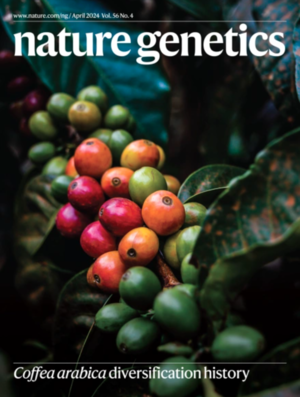The chromosome-level genomes of Coffea arabica, the most valued species of coffee, and its two progenitor species (C. canephora or Robusta and C. eugenioides), were published as a cover story in the April issue of Nature Genetics.
The study reconstructed the genomic history of the initial hybridization between the progenitor species 300,000-600,000 years ago in East Africa, the subsequent domestication and migration of Arabica from the Ethiopian plateau to Yemen, India, the East Indies and the island of Réunion, and analyzed the genomes of tens of different cultivars, including the spontaneous Timor hybrid between Arabica and Robusta, resistant to coffee rust Hemileia vastatrix, and the type specimen used by Carl Linnaeus to define the species.

“The extremely narrow genetic basis of Arabica coffee is striking,” says Prof. Giovanni Giuliano, coordinator of PRO-GRACE and one of the study’s co-authors. “It started with the initial hybridization bottleneck, followed by additional population bottlenecks. An important bottleneck started around 350,000 years ago (coincidentally, when the first Homo sapiens appeared in East Africa) and ended 15,000 years ago, at the beginning of the African humid period. A second bottleneck, found only in wild populations, started around 5,000 years ago and continues to this day. Additionally, the worldwide expansion of coffee cultivars often involved very few, or even a single individual, exacerbating the lack of genetic diversity and the consequent sensitivity of this species to biotic and abiotic stresses.”
Arabica coffee is the basis for 60% of coffee production worldwide, with a market value of over €40 billion annually.
“The genetic history of Arabica coffee not only sheds new light on the evolution of perennial polyploid crops, but, like that of many other crops, is closely intertwined with human history and culture. Studying and preserving the genetic diversity of crops and their wild relatives, both in their wild environments and in genebanks, is essential for the future of agriculture. That’s why we have launched the idea of GRACE-RI, a large European research infrastructure dedicated to the study and conservation of the crop plants that are key for our survival on this planet,” concludes Giuliano.
Read the paper
Salojärvi, J., Rambani, A., Yu, Z. et al. The genome and population genomics of allopolyploid Coffea arabica reveal the diversification history of modern coffee cultivars. Nat Genet 56, 721–731 (2024). https://doi.org/10.1038/s41588-024-01695-w